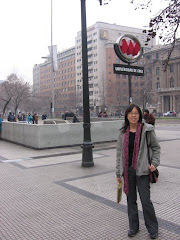Welcome to the Jungle
18 months ago, when I first decided to live in South America, my two travel goals were to visit Buenos Aires and the Galapagos Islands. This was before I realized how expensive both would be to visit, even from Peru. (Tourism to major destinations in South America is still somewhat of a luxury item, reserved for businessmen and foreigners.) What has turned out to be a lot more cost-effective, and adventurous, has been travel within Peru. Peru has lots of beaches, mountains, and ruins to visit, often with a smaller, cheaper tourist industry and more local flavor.
My friend Karen, a science teacher from New York, and I had first researched going to the Galapagos, but decided a tour of the Amazon would be far cheaper and just as packed with exotic animals. A Peruvian friend from the jungle told me I had to try this itinerary: a 16-hour bus (or 2 plane rides) to Tarapoto, followed by a van to Yurimaguas, where we could take a boat down the river for 2-3 days to Iquitos, and fly back from there. With images of The Motorcycle Diaries dancing through my brain, I decided to take Karen along with me on this voyage, and her friend Julie who also jumped at the opportunity.
There was only one catch. The jungle is a fun, but slightly lawless, place. In Peru it is almost seen as a separate country from the mountains and the coast, where most of the population and formal institutions are concentrated. In the jungle the gov't is nearly absent, illegal trade abounds, and "selvaticos" (people from the jungle) approach life with a casualness that borders on carelessness. (Case in point: everybody in the jungle rides motorcycles, but no one wears helmets or protective gear because "it's too hot".) So I asked my friend Lenin, a native of Moyobamba and a selvatico who's been living in Trujillo for the past 5 years, to come with us as our tour guide and bodyguard to keep us from getting ourselves completely lost or in trouble. He promised us a "Peruvian-style" tour, cheap and "a real adventure".
It would take too long to detail everything that happened, but it became an unforgettable trip. Over the next week we found ourselves without hot water, being eaten up by mosquitos, in close quarters with wild animals (and illegal animal products), being nearly swindled, riding to the airport in a "mototaxi" in such pouring rain that our luggage took a day and a half to dry, so coated in DEET and sunscreen that touching my camera made some of the button labels melt off, once covered in mud, usually covered in sweat, and on a few occasions in danger of landslides, piranha-infested waters, and generally unpredictable jungle conditions. However, we also saw pink dolphins, a wet sloth in our boat, an entire floating neighborhood right on the Amazon, and perhaps most memorably, an entire way of life that still exists in the Peruvian jungle (villagers paddling dugout canoes to market, workers carrying cargo barefoot with loads on their backs held in place by a strap across their foreheads, children swimming in the river as if it were their backyard).
Traveling "off the beaten track", especially in towns like Yurimaguas, is more than just "adventure travel" to me, especially after living in Peru for a year and befriending so many who are from the mountains and the jungle. The interior of the country is where lifestyles have changed the slowest, where the American fast food chains and Chilean department stores of Lima (and now Trujillo) have not yet replaced the village market or the street vendor. My friend Lenin told us ghost stories from the jungle and pointed out the woven palm roofs which reminded him of his grandmother's house, and we were transported to a completely different time and culture – one so exotic to a New Yorker, yet so palpable on this trip.
I can honestly say that the trip we made was a little too risky for me to recommend to any other American friends – and I'm somewhat relieved, because I know that the day the jungle becomes readily accessible and "safe" for tourists, it will have lost its distinctive charm. The jungle has actually undergone and survived one "cultural invasion" in the past, when the Spaniards pursued the Incas deep into the jungles to stamp them out, and both eventually intermingled with the population, forming cities and leaving behind a legacy of Spanish and Quechua speakers. I wonder if, fifty years from now, Lenin's grandchildren will still be able to swim in the rivers under a vibrant jungle canopy... or if they'll be living in sprawling cities doing deals on Wall Street instead.
SOOO Behind
15 years ago

1 comment:
Clara! Your jungle trip sounds amazing - especially the river. Sorry I haven't kept in touch. I do think about you often. Are you back in the States yet? We should get together if you're ever in the megapolis. I just found $1 bus tickets to NYC and no, they're not combis!
Post a Comment